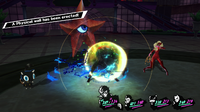Rebel's Guard / Tetrakarn / Makarakarn: Difference between revisions
No edit summary |
(→Origin) |
||
| Line 20: | Line 20: | ||
==Origin== | ==Origin== | ||
[[File:JokerUsingTetrakarn.png|thumb|Joker casting Tetrakarn on himself in ''Persona 5''.]] | |||
In the ''Persona'' series, guarding both reduces damage and prevents attacks that exploit the user's elemental weakness from downing them. | In the ''Persona'' series, guarding both reduces damage and prevents attacks that exploit the user's elemental weakness from downing them. | ||
The stance Joker takes while using Rebel's Guard is nearly identical to his animation in ''Persona 5'' when selecting a Persona skill. | The stance Joker takes while using Rebel's Guard is nearly identical to his animation in ''Persona 5'' when selecting a Persona skill. | ||
Tetrakarn and Makarakarn are support skills in '' | Tetrakarn and Makarakarn are recurring support skills in the ''Megami Tensei'' franchise, first appearing in 1992's ''Shin Megami Tensei''. Originally, Tetrakarn would simply block any single physical attack that hits the user's party, while Makarakarn would block any single magical attack that connects. Later games, including ''Persona 5'', would change this to have Tetrakarn and Makarakarn reflect the attack back at the caster. In ''Persona 5'', Arsene cannot learn either move normally, but can inherit them from other Personas via Skill Cards or Fusion. The sound effects they use in ''Super Smash Bros.'' are taken directly from their usage in ''Persona 5''. | ||
{{clr}} | {{clr}} | ||
Revision as of 20:37, September 5, 2019
| Rebel's Guard/Tetrakarn/Makarakarn | |
|---|---|
{{{content1}}}
{{{content2}}}
{{{content3}}} Joker using Rebel’s Guard, Tetrakarn, and Makarakarn. | |
| User | Joker |
| Universe | Persona |
| “ | Braces for an attack. If hit, charges the Rebellion Gauge. Press and hold to charge. While Arsene is active, counterattacks. | ” |
| —Description from Ultimate's Move List | ||
Rebel's Guard (反逆ガード, Rebellion Guard) is Joker's down special move in Super Smash Bros. Ultimate.
Overview
When the attack is activated, Joker will assume a defensive pose, and any hit given to him will fill his Rebellion Gauge, and cause him to take 0.4x the amount of damage. The special armor that Rebel's Guard uses comes out on Frame 3, which is faster than any other attack he has (Neutral attack being Frame 4). Attacks which stun, such as Rathalos's Roar, won't stun Joker while Rebel's Guard is active. Taking 28.6% while Rebel's Guard is active will fill the Rebellion Gauge instantly. When the player releases the button, Joker will perform a backhand, knocking the opponent away from him and dealing 2.4% and fixed knockback. There are no true followups to the backhand in this scenario, although frame traps and pressure can easily be enacted. It is possible to counter the backhand if the player doesn't release it quickly enough, although these scenarios are few and far between.
If Arsene is present when this move is inputted, Joker will instead use Tetrakarn (テトラカーン, Tetrakarn) or Makarakarn (マカラカーン, Makarakarn), depending on what attack is being used against him.
Tetrakarn is activated when the opponent uses a physical attack against him, causing Joker to counter the opponent with 1.6x the damage, with a 12% minimum. Furthermore, Tetrakarn has a 4 frame startup (among the fastest in the game) and a total FAF of 53, making it extremely fast and harder to punish compared to other counters. It is also the most damaging counter in the game, beating out King K. Rool's Gut Check and Mii Brawler's Counter Throw's 1.5x damage. Tetrakarn also has a very, very large hitbox. It covers both sides of Joker's body, as well as below and well above him. This allows for many plays that would be impossible for others, such as jumping down against recoveries with hitboxes and gimping the character without any real risk or chance of it missing.
If a projectile hits Joker instead, he will use Makarakarn, and reflect the projectile with 1.6x the damage and 1.9x the speed. This makes it one of the strongest reflectors in the game, only being beaten out in damage by Reversal Slash and Ness's forward smash. The speed of the reflected projectiles make it very difficult for opponents to try and play reflector wars against it, usually resulting in them losing due to it. The large hitbox as mentioned with Tetrakarn still exists as well, meaning he has a solid defense against coordinated assaults as well.
Origin
In the Persona series, guarding both reduces damage and prevents attacks that exploit the user's elemental weakness from downing them.
The stance Joker takes while using Rebel's Guard is nearly identical to his animation in Persona 5 when selecting a Persona skill.
Tetrakarn and Makarakarn are recurring support skills in the Megami Tensei franchise, first appearing in 1992's Shin Megami Tensei. Originally, Tetrakarn would simply block any single physical attack that hits the user's party, while Makarakarn would block any single magical attack that connects. Later games, including Persona 5, would change this to have Tetrakarn and Makarakarn reflect the attack back at the caster. In Persona 5, Arsene cannot learn either move normally, but can inherit them from other Personas via Skill Cards or Fusion. The sound effects they use in Super Smash Bros. are taken directly from their usage in Persona 5.
Gallery
Trivia
- While Futaba humorously questions the legality of having both a counter and reflector at the same time in Joker’s reveal trailer, both Gut Check and Counter/Reflect Barrier have similar functionality.

